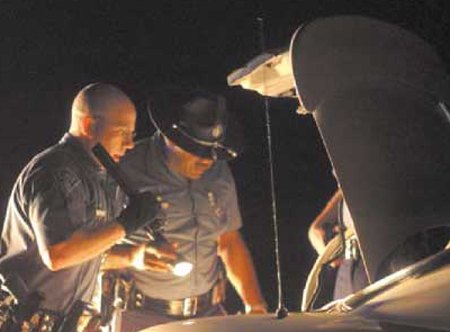Illinois ACLU: Stop Consent Searches to End Racial Profiling
"We now know — beyond any doubt — that minority drivers are targeted for humiliating, degrading roadside searches even though there is no evidence that they have broken any laws." That's how Harvey M. Grossman, Legal Director of the Illinois ACLU interprets recent stats prepared by the Northwestern University Center for Public Safety for the Illinois Department of Transportation. According to the report, in 2006, Illinois police officers asked 0.68% of white drivers for consent to search their car during traffic stops, compared to 2.04% of minority drivers. The ACLU wants to redress this balance by eliminating ALL consent searches (i.e. a police request for a search despite a lack of probable cause or reasonable suspicion of criminal activity). "State police forces in California and New Jersey have ended the practice of conducting consent searches," Grossman said. "The Illinois General Assembly should examine this data and move quickly to bar the practice in our state."
More by Robert Farago

































Comments
Join the conversation
I think one of the problems here is that the possible threats aren't even that 'veiled'. A police officer who has just pulled you over gets to decide whether or not to actually cite you. Everyone knows, or believes, that if they annoy the officer, they're more likely to get that ticket (and the large bill). hence, they may comply with a consent search. it's a form of coercion caused by the fact that the police have the leeway to decide your punishment. I think this is reason enough to eliminate the consent searches. not to mention being a good argument for being a little more explicit about what is/isn't ticketable.
@Sherman Lin: How about people regardless of race simply exercise their rights and simply not give their consent to a search. That would solve the problem. That would require people knowing their 4th amendment rights. With the way the schools are now, that ain't gonna happen. @theSane: In ‘96 an officer requested to search the vehicle I was in after being pulled over for driving without head lights on. I don’t really see a problem with it. Are you kidding? You have a right to privacy and there is no reason to let an agent of the government go poking around looking for stuff. All bets are off if you give the officer probable cause to suspect you're doing something illegal, but an innocent civilian traveling along the highway should in no way consent to a search.
Sherman: Of course you are right but that's beside the point. Police are trained to overcome objections, using various forms of intimidation, and implying (though not saying) that the person doesn't really have a right to refuse. IOW, police are allowed to take advantage of a person's ignorance, even if they know of it. While that may not be unconstitutional, it's certainly not good police work because it throws up a wall of mistrust between the police and the people who (remember) they are sworn to serve and protect. SDWINFLA: You're talking apples and oranges. Consent searches are a completely different animal from PC searches. PC searches are legal and require absolutely no consent or cooperation at all. An officer can simply state that he has PC to search. At that time, he can search. If the driver or passengers get in the way of the officers search, he can cuff them and put them in his car while he conducts the search. No consent required. If contraband is found and the driver is arrested, he can later challenge the PC in court. If the court says the officer did not have PC then the results of the search are suppressed under the exclusionary rule. Now, put yourself in the position of a person stopped by the side of the road. The officer can imply that he has PC to search, when in fact he does not. He can tell you that if he has PC he does not need your consent, so why not just consent and let him search? Notice the verbal sleight of hand: If the officer conducts the search and then finds evidence of a crime, the driver cannot challenge the PC of the search (which may never have been present in the first place) because the search was not done as a PC search, it was done as a consent search. While the courts have started to crack down on this type of behavior, it's more common than most people might think, and IMO it's just wrong.